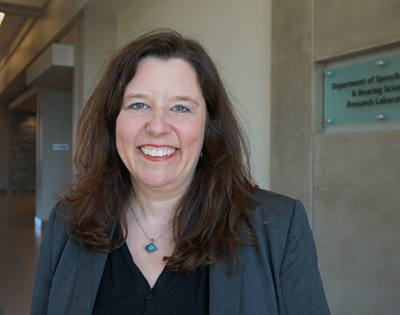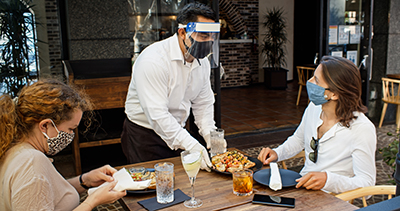Thinking Beyond the Pandemic
Rapid Response Grant Projects Start Tackling COVID-19’s Long-Term Consequences Now
Story by Becky Brown
The first priority at the start of a pandemic is protecting public health, so it only makes sense that much of the initial COVID-19 research — and the funding behind it — focused on answering these questions: How is the virus contracted and spread? What are the most effective treatments? How quickly can a vaccine be developed?
The ramifications of a pandemic, however, extend far beyond the immediate physiological effects. And that’s where a group of College of Health and Human Sciences researchers are concentrating their efforts, thanks to a new Rapid Response Grant program established during the early days of COVID-19.
Seven different HHS research teams are taking advantage of these grants to study the pandemic’s long-term effects — not just on physical health but on mental, social and economic health, too. They’re tackling topics as diverse as nurse trauma, swallowing disorders, the behavior of restaurant-goers, the food supply chain in Kenya, and the challenges faced by single mothers, the homeless and caregivers of children with special needs.
“COVID-19 is disrupting so many aspects of human functioning and quality of life,” says Marion Underwood, dean of HHS. “Our focus is on these disruptions and their consequences on families, the food supply, the health care system, health disparities, the economy and more.”
No time to waste
HHS’s Rapid Response Grant program was conceived by Jessica Huber, associate dean for research, and Patrick Hein, senior research development administrator. The $10,000, one-year grants aim to jumpstart small-scale research projects that address outcomes and mitigate risks resulting from the pandemic.

"Other universities were providing broader, larger grants, most with a health focus. What made our program different is that we focused on health and human behavior." — Jessica Huber, HHS associate dean for research
“Other universities were providing broader, larger grants, most with a health focus,” Huber says. “What made our program different is that we focused on health and human behavior. We’re not looking for a vaccine in HHS — that’s not what we do. We’re looking ahead past the pandemic to all of the fallout.”
Unlike traditional grant programs, where applicants often spend months writing highly detailed proposals, then wait months to learn the status of their applications, the Rapid Response Grant program was true to its name. Faculty received funding opportunity materials on March 31 and the first grant was awarded April 3. All seven projects were underway by mid-July.
“We designed the process to be fast,” Hein says. “We kept the grant application short and focused, and our review group was small so we could provide feedback right away.”
Funding for the Rapid Response Grant program came from HHS research dollars set aside by the dean, who saw the value in providing small amounts of funding quickly to researchers.
“I was compelled by the need to support our faculty to begin immediately collecting data to examine the severe impact of COVID-19 on quality of life and health,” Underwood says. “There was no time to waste.”
The right mix of projects
Given the widespread effects of the pandemic on health and human behavior, the HHS research team was hopeful that applications for the Rapid Response Grant program would be as diverse as the college’s nine academic units. They weren’t disappointed.
“We received applications from all across the college,” Hein says. “We wanted to make the program inclusive, because COVID-19 affects everybody in some way — physical health issues, mental health issues, employment issues. The distribution of grants certainly reflects that.”
Two of the seven projects that received funding through the program are specifically tied to health care: a study of nurse trauma, and an investigation into using telehealth practices to diagnose and manage swallowing disorders.
The other five projects venture into topics some might not immediately associate with COVID-19, but each makes a direct connection between the researcher’s area of expertise and the pandemic. That was an important factor in awarding the grants, as Huber and Hein wanted to ensure every project aligned with and built upon existing HHS research priorities.
Karen Byrd, assistant professor in the School of Hospitality and Tourism Management, for example, is leading a team looking into the convergence of human health and the economic “health” of the restaurant industry, which is the U.S.’s second-largest private sector employer and recipient of approximately 50% of American consumers’ food dollars.
 Professor Karen Byrd heads a project researching the convergence of human health and the economic “health” of the restaurant industry, which has been devastated by COVID-19
Professor Karen Byrd heads a project researching the convergence of human health and the economic “health” of the restaurant industry, which has been devastated by COVID-19
“Because of the industry’s importance as both a food source and an employer, we wanted to understand consumers’ reactions and perceptions — or misperceptions — about safely obtaining restaurant food,” Byrd says. “Comparing how behavior, perceptions and attitudes changed throughout COVID-19 should help consumers, public health officials and the restaurant industry better manage the next pandemic or emergency situation.”
Starting small to go big
Compared with grants provided by major funding agencies such as the National Institutes of Health, World Health Organization, National Science Foundation and others, the $10,000 Rapid Response Grants are small monetarily. But the HHS research team was confident they would serve as a steppingstone to future, bigger funding from those very agencies.
“We knew there would be a second round of grants from funding agencies focused on the repercussions of the pandemic,” Hein says. “We put this together as a pilot grant program to help our researchers gather preliminary data, so they’d be prepared to submit for those larger grant opportunities. We wanted them to be ahead of the game.”
That strategy has paid off, with several of the Rapid Response Grant projects already moving into their next phases.
Georgia Malandraki, associate professor in the Department of Speech, Language, and Hearing Sciences, is awaiting review on an approximately $2 million grant from the Patient-Centered Outcomes Research Institute to continue her team’s research into providing swallowing and speech services via telehealth. She also intends to submit a grant proposal to the NIH.
Bridgette Kelleher, associate professor in the Department of Psychological Sciences and co-director of the Purdue Autism Research Center, has applied for a $3 million grant from the NIH to further her team’s assessment of the pandemic’s effects on families of children with special needs.
Two Rapid Response Grant projects investigating the consequences of COVID-19 on unique populations — the homeless and single mothers — are likely to attract major funding agency dollars as well.
“We’re seeing lots of interest from funding agencies in minority health disparity issues,” Hein says. “They want to know why COVID-19 is hitting certain populations harder and what we can do to prevent that from happening in the future.”
Adapting to remote research
The seven research studies funded by the Rapid Response Grant program may be diverse in nature, but every research team has faced one common challenge: adjusting to a remote working environment.
“We’re very much a college that interacts with human beings. We’re very collaborative,” Huber says. “Turning to remote research is a whole new world, but our faculty developed their studies with that mindset. They knew they would have to adapt and they did so very quickly.”
Zoe Taylor, associate professor in the Department of Human Development and Family Studies, found the shift from face-to-face to virtual interaction fairly painless — primarily because she’d already built rapport with her research subjects, a group of 200 single mothers across Indiana, during a previous project. One of the Rapid Response Grant projects, led by Professor Zoe Taylor of the Department of Human Development and Family Studies, is examining the consequences of COVID-19 on single mothers.
One of the Rapid Response Grant projects, led by Professor Zoe Taylor of the Department of Human Development and Family Studies, is examining the consequences of COVID-19 on single mothers.
“When the pandemic started, I thought a lot about those women and wondered how they were coping with being single parents during such a challenging time,” she says. “I thought doing Zoom interviews might feel more impersonal and that the mothers wouldn’t talk as much. But because I had already spoken to them in person, it worked better than expected.”
Realizing that remote work is not only effective but also likely to be the way of the future, the swallowing disorders research group even began adapting some of its older projects to a virtual environment.
“It was a pleasant surprise to see that very valuable data can be collected remotely,” Malandraki says. “I believe this data will be extra beneficial, because it was collected in our patients’ natural environments, their homes.”
Ready for the next crisis
When the Rapid Response Grant program was established in March, the HHS research team was already looking ahead to a post-pandemic world. That’s why the grants were structured with a one-year timeframe.
Now that it’s clear COVID-19 will be with us for the foreseeable future — and that the possibility of other health-related crises occurring is high — they plan to keep the program alive and ready for the next time a rapid research response is needed.
“There may be other disruptors sooner rather than later,” Dean Underwood says. “This rapid pilot mechanism will let us respond by supporting our faculty experts in immediately investigating the impact on human health and quality of life.”
More Life 360 Stories
Milestones
Alumni
- Model Behavior
- On the Frontline of COVID-19
- Alumni making giant leaps in health care, aviation industries
- Tradition Transformed
- Emerging Leaders
Research
- Wearable and affordable, device targets swallowing disorders
- Evolution of a Research Relationship: From PhD Student to Peer
- Rapid Response Grant Recipients
Faculty
- Wearable and affordable, device targets swallowing disorders
- Beware the ‘quarantini’
- Safe and sustainable tourism in times of COVID-19
- Building a Community of Support
- Adapting Online … in a Hurry
- Thinking Beyond the Pandemic
- Rapid Response Grant Recipients
- Risk & Resilience: How the Pandemic Affects Those with Special Needs
Students
- Evolution of a Research Relationship: From PhD Student to Peer
- On the Frontline of COVID-19
- Tradition Transformed
- Adapting Online … in a Hurry
- Pandemic Pivot brings Gen Zs and Baby Boomers together in unique way
- HTM students learn and build community
- Emerging Leaders

